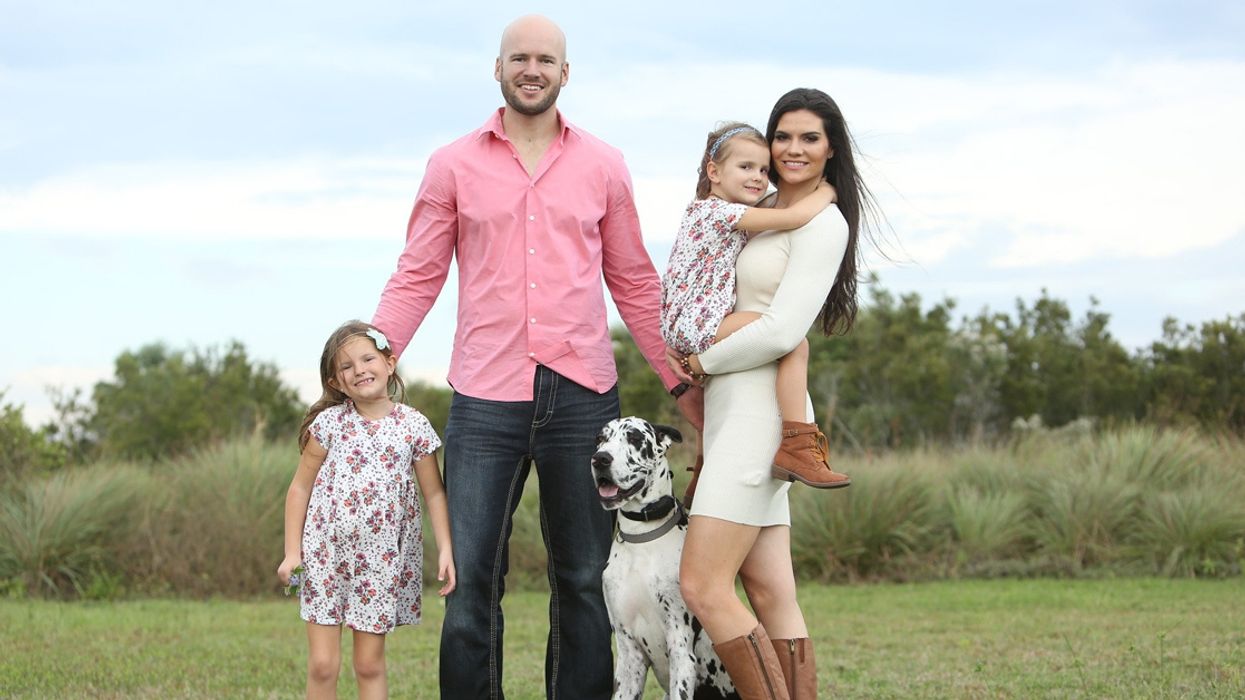A doting mom who was left fearing for her sanity after being plunged into a world of delusions and hallucinations by terrifying postpartum psychosis told how she banished her demons by pumping iron and winning a “bikini body" contest.
Heather Messenger, 33, of Sarasota, Florida, felt certain she would live “happily ever after" when she and her husband, Miles, 34, whose firm manufactures golf carts, had their eldest daughter, Nichole, eight.
But when, 15 months later, they started trying for a second child and had a miscarriage at 12 weeks, followed by a difficult pregnancy before their daughter Brooke, now six, arrived, Heather's life was torn apart by a harrowing mental illness.

Heather, a network marketing professional, said: “Postpartum psychosis is a dangerous illness. It started out as a deep depression, but it quickly got worse.
“I had demon-like voices in my head. I couldn't sleep, I was agitated, and I couldn't be trusted to look after my children alone."
Described by the NHS as a “rare but serious mental health illness that can affect a woman soon after she has a baby," with symptoms ranging from hallucinations and delusions to mania, depression, confusion, and loss of inhibitions, Heather first started feeling unwell within days of giving birth to Brooke in August 2013.

And when Miles returned to work a day after Brooke was born and with her supply teacher mom away in Europe, left alone with her daughters, her anxiety soon became explosive.
“I started ignoring people's calls and I didn't invite any family round to meet Brooke," Heather said. “I was always anxious, I felt alone and started feeling dizzy.
“I couldn't stop crying and I felt like I was losing myself and my daughters were losing their mother."
This experience was in stark contrast to how she felt after having Nichole, when she was “on cloud nine."
“She was my world – I was always taking her out and about to show her off to everyone," she said.
Jokingly dubbed the “giant family," because Miles is 6ft 9in and Heather is 6ft 1in, the couple had loved their first foray into parenthood with Nichole.

And, after seeing her own parents Diane and Mark, both 65, split up when she was just three-years-old, a traditional family set-up had always been very important to Heather.
But, after miscarrying 12 weeks into her second pregnancy, her idyllic early experience of parenthood looked set to change.
“I can't describe what it felt like," she said. “It was so stressful and sad, but I didn't allow myself to heal properly, I brushed myself off and carried on."

Two months later, when Heather fell pregnant with Brooke, rather than feeling excited, she was overcome with worry.
“When I was pregnant with Nichole, I wasn't too strict about what I ate or what I did. But with Brooke I was so careful about everything – I wouldn't even breathe near soft cheese," she said.
At nine weeks pregnant, Heather started to bleed but, thankfully, doctors reassured her, saying her unborn baby was fine.
But panic set in again when she slipped and fell on to her stomach at eight months pregnant.
“I was so worried that when the doctors told me she was okay and showed me her heartbeat it felt amazing," she said.
Instead of feeling the “rush of love" she had experienced when Nichole was born, however, when Brooke arrived, she recalls that "something felt off."
“I was scared to go home. I know it's normal, but I think it was a warning sign," she said.
Still, Heather soldiered on – but she continued spiraling downwards until, two weeks after giving birth, she felt so unstable she saw her doctor.
She explained she felt scared and was sad all the time, and so, she was diagnosed with postnatal depression – a common problem after childbirth, according to the NHS, which can leave women feeling down, tearful and anxious, but usually lifts within a few weeks – and prescribed antidepressants.

Instead of seeing her mood lift, though, Heather began having terrifying psychotic thoughts, when she would hear voices telling her to harm herself or her daughters.
Fearing what might happen if she was left alone with her children, eight weeks after giving birth to Brooke, she and Miles went to live with her mom for a while.
Once more she saw her doctor, and despite still feeling scared to confess her fears, Heather described the visions she had been experiencing, and this time she was diagnosed with postpartum psychosis and prescribed Paxil – an antidepressant used to treat anxiety and anxiety disorders.
She was allowed back home as she had a great family support, and her mother was there to help take care of the children.
But still, her mental health continued to deteriorate.
She said: “I couldn't sleep for more than 45 minutes at a time. My body felt like I'd drunk hundreds of cups of coffee. I became very separate from my daughters and would try to nap all the time."

She continued: “I started to resent Brooke and wish she'd never been born. Everything had been perfect before she came along. I thought it was all her fault.
“I heard voices in my head constantly. I'd pace around the room a lot like I was possessed. I'd bang on the door and yell, 'Make them stop.'
“One time Miles was so concerned about my behavior he took the girls out of the house, so they couldn't see me in that state."

Luckily, Heather's mom took over, persuading her daughter to take a back seat while she looked after the girls.
Heather, who has a hazy memory of this period of her life, but believes her psychosis lasted for about six months, said: “As well as hearing voices, I started hallucinating. Once I thought my tongue was swelling up and I couldn't breathe.
“I'd see this purple smoke and a demon would appear. I'd just close my eyes and pray it'd go away."
“Miles and my family were so worried, they told me never to be alone by myself. I knew I needed more help," she continued.
Eventually, in November, Heather began seeing a psychiatrist every other week, and a therapist twice a week – until she started feeling better and the sessions went down to once a week.
Over a period of four months, she shared with therapist what she was thinking and, thankfully, her dark thoughts and the voices in her head disappeared.
Finally, six months after her terrible visions began, they ceased, and Heather was at last able to leave her mom's and resume the family life she had always wanted in their own home.
“I felt like I was going to be stuck like that forever, when it was going on. But speaking about what I was going through helped me so much," said Heather.
“I don't know what triggered my psychosis, but I had such a stressful pregnancy and that could've contributed to it."

Around eight months after it began, Heather was also diagnosed with post-traumatic stress disorder, as she tried to process the horrifying thoughts that had clouded her mind.
“I felt so guilty that I'd thought evil things about my daughters," Heather said.
“It took me about a year to feel comfortable alone. I was scared of sleep because I was scared to be alone with my own thoughts. “
Determined to return to full health after her postpartum psychosis, which, according to the NHS, can see the most severe symptoms lasting two to 12 weeks, while it can take six to 12 months or more to recover from the condition, Heather also began a carefully constructed exercise and meal plan.
“I realized that taking care of myself would enable me to become a better mother. I started healing my body on the inside and out," she said.
And in 2015, by then the picture of health, Heather – who is positive her top physical form has helped to keep her mental health in check – looked so good she entered Fitness Universe, a bikini body competition in Miami, Florida, and won first place.

“For me, the competition wasn't about winning, it was about realizing I was a strong woman and what I'd managed to overcome," Heather said. “I was shaking and crying on the stage. But honestly, I felt like I was bullet proof and like I was 10ft tall – it was amazing.
“Fitness and healthy eating did wonders for my mind and it's now allowed me to become a better mother, too.
“Brooke and I have a very special bond now. We're a really close family. I'm grateful for what I've been through, because I've come out the other side a stronger, better mother."

“I'm also so grateful for my husband and my family's support – I wouldn't have come through this if it wasn't for them," she continued.
“By talking about what happened, I was able to process the psychosis and move on from it. Even though I was scared, it was the best thing I could've done, and I'd encourage any woman in a similar situation to do the same.
“And I now know that to keep a healthy mind, I need to have a healthy body, too."
Postpartum psychosis should be treated as a serious medical emergency, according to Dr. Jessica Heron, CEO of Action on Postpartum Psychosis.
She said: “Postpartum psychosis is a life-threatening postnatal illness, which onsets normally in the days and weeks following childbirth. Hallucinations, delusions, confusion, elated or depressed, anxious and agitated mood, with erratic or unusual behavior escalates rapidly.
“Women require immediate care – psychiatric hospital admission, ideally with their baby to minimize the impact on bonding and the trauma experienced – although unfortunately not many units like this exist in the US."

While symptoms of psychosis usually last a few weeks to months, it is often followed by a lengthy depression.
Dr. Heron added: “With the right care, women recover fully from this illness, although the path to recovery can be a tough one."
APP is a UK based collaboration between women and families who have been affected by Postpartum Psychosis (PP), leading academic researchers and expert health professionals.
Find out more at www.app-network.org








 Roberto Schmidt/AFP via Getty Images
Roberto Schmidt/AFP via Getty Images





 u/pizzaratsfriend/Reddit
u/pizzaratsfriend/Reddit u/Flat_Valuable650/Reddit
u/Flat_Valuable650/Reddit u/ReadyCauliflower8/Reddit
u/ReadyCauliflower8/Reddit u/RealBettyWhite69/Reddit
u/RealBettyWhite69/Reddit u/invisibleshadowalker/Reddit
u/invisibleshadowalker/Reddit u/Wishnik6502/Reddit
u/Wishnik6502/Reddit u/kateastrophic/Reddit
u/kateastrophic/Reddit u/blking/Reddit
u/blking/Reddit u/SlagQueen/Reddit
u/SlagQueen/Reddit u/geezeslice333/Reddit
u/geezeslice333/Reddit u/meertaoxo/Reddit
u/meertaoxo/Reddit u/crystal_clear24/Reddit
u/crystal_clear24/Reddit u/stinkpot_jamjar/Reddit
u/stinkpot_jamjar/Reddit
 u/Bulgingpants/Reddit
u/Bulgingpants/Reddit
 @hackedliving/TikTok
@hackedliving/TikTok @hackedliving/TikTok
@hackedliving/TikTok @hackedliving/TikTok
@hackedliving/TikTok @hackedliving/TikTok
@hackedliving/TikTok @hackedliving/TikTok
@hackedliving/TikTok @hackedliving/TikTok
@hackedliving/TikTok @hackedliving/TikTok
@hackedliving/TikTok @hackedliving/TikTok
@hackedliving/TikTok @hackedliving/TikTok
@hackedliving/TikTok @hackedliving/TikTok
@hackedliving/TikTok
 @vanderjames/Instagram
@vanderjames/Instagram @vanderjames/Instagram
@vanderjames/Instagram @vanderjames/Instagram
@vanderjames/Instagram @vanderjames/Instagram
@vanderjames/Instagram @vanderjames/Instagram
@vanderjames/Instagram @vanderjames/Instagram
@vanderjames/Instagram @vanderjames/Instagram
@vanderjames/Instagram @vanderjames/Instagram
@vanderjames/Instagram @vanderjames/Instagram
@vanderjames/Instagram @vanderjames/Instagram
@vanderjames/Instagram